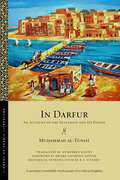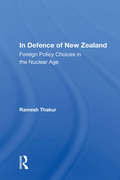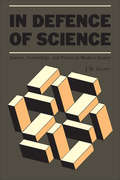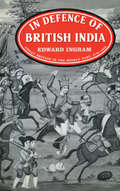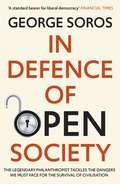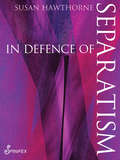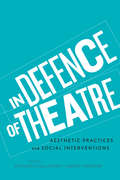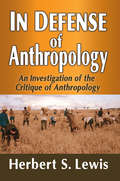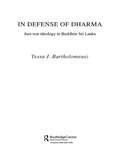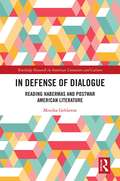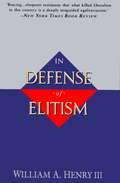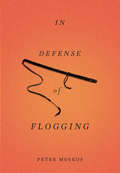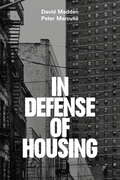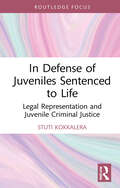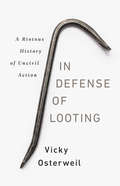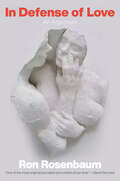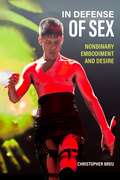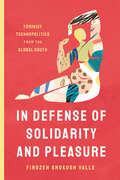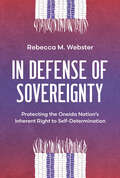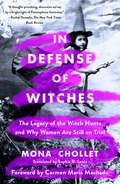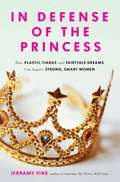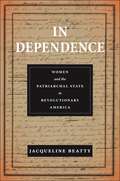- Table View
- List View
In Darfur: An Account of the Sultanate and Its People (Library of Arabic Literature #70)
by Muḥammad al-TūnisīA merchant’s remarkable travel account of an African kingdomMuḥammad al-Tūnisī (d. 1274/1857) belonged to a family of Tunisian merchants trading with Egypt and what is now Sudan. Al-Tūnisī was raised in Cairo and a graduate of al-Azhar. In 1803, at the age of fourteen, al-Tūnisī set off for the Sultanate of Darfur, where his father had decamped ten years earlier. He followed the Forty Days Road, was reunited with his father, and eventually took over the management of the considerable estates granted to his father by the sultan of Darfur.In Darfur is al-Tūnisī’s remarkable account of his ten-year sojourn in this independent state, featuring descriptions of the geography of the region, the customs of Darfur’s petty kings, court life and the clothing of its rulers, marriage customs, eunuchs, illnesses, food, hunting, animals, currencies, plants, magic, divination, and dances. In Darfur combines literature, history, ethnography, linguistics, and travel adventure, and most unusually for its time, includes fifty-two illustrations, all drawn by the author.In Darfur is a rare example of an Arab description of an African society on the eve of Western colonization and vividly evokes a world in which travel was untrammeled by bureaucracy, borders were fluid, and startling coincidences appear almost mundane.An English-only edition.
In Defence Of New Zealand: Foreign Policy Choices In The Nuclear Age
by Ramesh ThakurNuclear-free zones, neutrality, and nonalignment are catchwords that recently have earned unprecedented international publicity for New Zealand's foreign policy. That country's defence policy has also been subjected to its most searching scrutiny since World War II. In this book, Dr. Ramesh Thakur addresses in depth the issues underlying worldwide
In Defence of Science: Science, Technology, and Politics in Modern Society
by Jack GroveScience holds a central role in the modern world, yet its complex interrelationships with nature, technology, and politics are often misunderstood or seen from a false perspective. In a series of essays that make extensive use of original work by sociologists, historians, and philosophers of science, J.W. Grove explores the roles and relationships of science in modern technological society. Modern Science can be viewed from four related perspectives. It is an expression of human curiosity – a passion to understand the natural world: what it is made of, how it is put together, and how it works. It is a body of practice – a set of ways of finding out that distinguish it from other realms of inquiry. It is a profession – a body of men and women owing allegiance to the pursuit of knowledge – and for those people, a career. And it is a prescriptive enterprise in that the increase of scientific understanding makes it possible to put nature to use in new kinds of technology. Each of these aspects of science is today the focus of critical scrutiny and, often, outright hostility. With many examples, Grove exposes the threats to science today: its identification with technology, its subordination to the state, the false claims made in its name, and the popular intellectual forces that seek to denigrate it as a source of human understanding and progress.
In Defence of British India: Great Britain in the Middle East, 1775-1842
by Edward IngramFirst Published in 1984. Routledge is an imprint of Taylor & Francis, an informa company.
In Defence of Open Society: The Legendary Philanthropist Tackles the Dangers We Must Face for the Survival of Civilisation
by George SorosGeorge Soros is among the world's most prominent public figures. He is one of the history's most successful investors and his philanthropy, led by the Open Society Foundations, has donated over $14 billion to promote democracy and human rights in more than 120 countries. But in recent years, Soros has become the focus of sustained right-wing attacks in the United States and around the world based on his commitment to open society, progressive politics and his Jewish background. In this brilliant and spirited book, Soros offers a compendium of his philosophy, a clarion call-to-arms for the ideals of an open society: freedom, democracy, rule of law, human rights, social justice, and social responsibility as a universal idea. In this age of nationalism, populism, anti-Semitism, and the spread of authoritarian governments, Soros's mission to support open societies is as urgent as it is important.
In Defence of Separatism (Spinifex Shorts)
by Susan HawthorneIn Defence of Separatism is a timely book. When it was first written in 1976, although it was an important subject of conversation among many feminists it was not welcomed by academics or publishers. When a political group wants to strategise so that its members can arrive at agreed-on political tactics and ideas, they call for, and create, separate spaces. These might be in coffee shops, in community centres, in one another's homes or in semi-public spaces such as workers clubs, even cinemas. When the proletariat was rebelling, they did not ask the capitalists and aristocracy to join them (even if a few did); when the civil rights movement started it was not thanks to the ideas and politics of white people (even though some whites joined to support the cause); when the women's liberation movement sprang into life, it was women joining together to fight against their oppression. The difference is that women are supposed to love men.Through careful argument, Susan Hawthorne takes us through the ideas which are central to her argument. She analyses the nature of power, oppression, domination and institutions and applies these to heterosexuality, rape and romantic love. She concludes with a call for women, all women no matter their sexuality, to have separate spaces so they can work together to change the world and end patriarchy.This 2019 edition includes a Preface, Afterword and additional commentary in italicised footnotes that bring the reader up to date on changes, developments and controversies in feminist theory.
In Defence of Theatre: Aesthetic Practices and Social Interventions
by Kathleen Gallagher Barry FreemanWhy theatre now? Reflecting on the mix of challenges and opportunities that face theatre in communities that are necessarily becoming global in scope and technologically driven, In Defence of Theatre offers a range of passionate reflections on this important question.Kathleen Gallagher and Barry Freeman bring together nineteen playwrights, actors, directors, scholars, and educators who discuss the role that theatre can - and must - play in professional, community, and educational venues. Stepping back from their daily work, they offer scholarly research, artists' reflections, interviews, and creative texts that argue for theatre as a response to the political and cultural challenges emerging in the twenty-first century. Contributors address theatre's contribution to local and global politics of place, its power as an antidote to various modern social ailments, and its pursuit of equality. Of equal concern are the systematic and practical challenges that confront those involved in realizing theatre's full potential.
In Defense of Anthropology: An Investigation of the Critique of Anthropology
by Herbert S. LewisThis book argues that the history and character of modern anthropology has been egregiously distorted to the detriment of this intellectual pursuit and academic discipline. The "critique of anthropology" is a product of the momentous and tormented events of the 1960s when students and some of their elders cried, "Trust no one over thirty!" The Marxist, postmodern, and postcolonial waves that followed took aim at anthropology and the result has been a serious loss of confidence; both the reputation and the practice of anthropology has suffered greatly. The time has come to move past this damaging discourse. Herbert S. Lewis chronicles these developments, and subjects the "critique" to a long overdue interrogation based on wide-ranging knowledge of the field and its history, as well as the application of common sense. The book questions discourses about anthropology and colonialism, anthropologists and history, the problem of "exoticizing'the Other,'" anthropologists and the Cold War, and more. Written by a master of the profession, In Defense of Anthropology will require consideration by all anthropologists, historians, sociologists of science, and cultural theorists.
In Defense of Dharma: Just-War Ideology in Buddhist Sri Lanka (Routledge Critical Studies in Buddhism #Vol. 24)
by Tessa J. BartholomeuszThis is the first book to examine war and violence in Sri Lanka through the lens of cross-cultural studies on just-war tradition and theory. In a study that is textual, historical and anthropological, it is argued that the ongoing Sinhala-Tamil conflict is in actual practice often justified by a resort to religious stories that allow for war when Buddhism is in peril. Though Buddhism is commonly assumed to be a religion that never allows for war, this study suggests otherwise, thereby bringing Buddhism into the ethical dialogue on religion and war. Without a realistic consideration of just-war thinking in contemporary Sri Lanka, it will remain impossible to understand the power of religion there to create both peace and war.
In Defense of Dialogue: Reading Habermas and Postwar American Literature (Routledge Research in American Literature and Culture)
by Monika GehlawatIn Defense of Dialogue: Reading Habermas and Postwar American Literature offers a timely investigation of the value of dialogue in contemporary American culture. Using Jürgen Habermas’s theory of communicative action to read the work of Frank O’Hara, James Baldwin, Grace Paley, and Andy Warhol, In Defense of Dialogue assembles postwar writers who have never been studied alongside one another, showing how they overcame the pervading skepticism of their contemporaries to imagine sincere and rational speakers who seek to cultivate intersubjective discourse.
In Defense of Elitism
by William A. HenryFrom the Pulitzer Prize-winning culture critic for Time magazine comes the tremendously controversial, yet highly persuasive, argument that our devotion to the largely unexamined myth of egalitarianism lies at the heart of the ongoing "dumbing of America."Americans have always stubbornly clung to the myth of egalitarianism, of the supremacy of the individual average man. But here, at long last, Pulitzer Prize-winning critic William A. Henry III takes on, and debunks, some basic, fundamentally ingrained ideas: that everyone is pretty much alike (and should be); that self-fulfillment is more imortant thant objective achievement; that everyone has something significant to contribute; that all cultures offer something equally worthwhile; that a truly just society would automatically produce equal success results across lines of race, class, and gender; and that the common man is almost always right. Henry makes clear, in a book full of vivid examples and unflinching opinions, that while these notions are seductively democratic they are also hopelessly wrong.
In Defense of Flogging
by Peter MoskosMoskos (law, police science, and criminal justice administration, John Jay College of Criminal Justice and City U. of New York) offers a creative critique of the current criminal justice system. Whether or not he actually believes that flogging is the most appropriate alternative, the author presents details regarding recommended implementation in an attempt to open up discussion of alternatives to imprisonment. Annotation ©2011 Book News, Inc. , Portland, OR (booknews. com)
In Defense of Housing: The Politics of Crisis
by David Madden Peter MarcuseIn every major city in the world there is a housing crisis. How did this happen and what can we do about it?Everyone needs and deserves housing. But today our homes are being transformed into commodities, making the inequalities of the city ever more acute. Profit has become more important than social need. The poor are forced to pay more for worse housing. Communities are faced with the violence of displacement and gentrification. And the benefits of decent housing are only available for those who can afford it.In Defense of Housing is the definitive statement on this crisis from leading urban planner Peter Marcuse and sociologist David Madden. They look at the causes and consequences of the housing problem and detail the need for progressive alternatives. The housing crisis cannot be solved by minor policy shifts, they argue. Rather, the housing crisis has deep political and economic roots—and therefore requires a radical response.
In Defense of Justice: Joseph Kurihara and the Japanese American Struggle for Equality (The Asian American Experience)
by Eileen TamuraAs a leading dissident in the World War II concentration camps for Japanese Americans, the controversial figure Joseph Yoshisuke Kurihara stands out as an icon of Japanese American resistance. In emotional, often inflammatory speeches, Kurihara attacked the U.S. government for its treatment of innocent citizens and immigrants. Because he articulated what other inmates dared not voice openly, he became a spokesperson for camp inmates. In this astute biography, Kurihara's life provides a window into the history of Japanese Americans during the first half of the twentieth century. Born in Hawai'i to Japanese parents who immigrated to work on the sugar plantations, Kurihara worked throughout his youth and early adult life to make a place for himself as an American: seeking quality education, embracing Christianity, and serving as a soldier in the U.S. Army during World War I. Though he bore the brunt of anti-Japanese hostility in the decades before World War II, he remained adamantly positive about the prospects of his own life in America. The U.S. entry into World War II and the forced removal and incarceration of ethnic Japanese destroyed that perspective and transformed Kurihara. As an inmate at Manzanar in California, Kurihara became one of the leaders of a dissident group within the camp and was implicated in "the Manzanar incident," a serious civil disturbance that erupted on December 6, 1942. In 1945, after three years and seven months of incarceration, he renounced his U.S. citizenship and boarded a ship for Japan, where he had never been before. He never returned to the United States. Kurihara's personal story illuminates the tragedy of the forced removal and incarceration of U.S. citizens among the West Coast Nikkei, even as it dramatizes the heroic resistance to that injustice. Shedding light on the turmoil within the camps as well as the sensitive and formerly unspoken issue of citizenship renunciation among Japanese Americans, In Defense of Justice explores one man's struggles with the complexities of loyalty and resistance.
In Defense of Juveniles Sentenced to Life: Legal Representation and Juvenile Criminal Justice (Routledge Contemporary Issues in Criminal Justice and Procedure)
by Stuti S. KokkaleraThis book examines how attorneys enable a meaningful opportunity for release for individuals sentenced to life as juveniles. The work provides a detailed overview of how legal representation facilitates opportunities for release for juveniles sentenced to life: “juvenile lifers”. It contributes to the broader literature on the importance of legal representation in the criminal legal system by investigating the role of an attorney in the parole process. Drawing on interviews with lawyers and qualitative content analyses of attorney participation in parole recordings from one state, the study illustrates how attorney assistance provides an important due process protection in the highly discretionary context of parole. The analysis of attorney representation is situated in the history of how they became prominent in the criminal legal system, and how their assistance has been viewed as vital in the parole process. Prior criminological and legal research relates the impact a lawyer can have by preparing a juvenile lifer candidate to present a suitable narrative for release, one that relates their diminished criminal culpability and rehabilitative efforts to prepare for life beyond prison. The work will be relevant to students, academics, and policy makers, particularly for state parole boards, public defender agencies, and legislatures. While the analysis is based on the experience of one state, the findings are generalizable to other states and countries that similarly conduct parole board hearings for not just their juvenile populations but also adults.
In Defense of Looting: A Riotous History of Uncivil Action
by Vicky OsterweilA fresh argument for rioting and looting as our most powerful tools for dismantling white supremacyLooting--a crowd of people publicly, openly, and directly seizing goods--is one of the more extreme actions that can take place in the midst of social unrest. Even self-identified radicals distance themselves from looters, fearing that violent tactics reflect badly on the broader movement.But Vicky Osterweil argues that stealing goods and destroying property are direct, pragmatic strategies of wealth redistribution and improving life for the working class--not to mention the brazen messages these methods send to the police and the state. All our beliefs about the innate righteousness of property and ownership, Osterweil explains, are built on the history of anti-Black, anti-Indigenous oppression.From slave revolts to labor strikes to the modern-day movements for climate change, Black lives, and police abolition, Osterweil makes a convincing case for rioting and looting as weapons that bludgeon the status quo while uplifting the poor and marginalized. In Defense of Looting is a history of violent protest sparking social change, a compelling reframing of revolutionary activism, and a practical vision for a dramatically restructured society.
In Defense of Love: An Argument
by Ron RosenbaumFrom the acclaimed author of The Shakespeare Wars and Explaining Hitler comes a stirring manifesto on love in the modern age.Who wrote the book of love?In an impassioned polemic, Ron Rosenbaum—who has written books on the mysteries of Hitler&’s evil, the magic of Shakespeare&’s words, and the terrifying power of thermonuclear explosions—takes on perhaps his greatest challenge: the nature of love. Rosenbaum argues that what we know as love is imperiled now by the quantifiers, the digitizers, and their algorithms, who all seek to reduce love to electrical, chemical, and mathematical formulas.Rosenbaum brings excitement to his thinking as he interrogates the neuroscience of love, with its &“trait constellations,&” and the efforts of others to turn all human lovers into numerical configurations. He asks us why our culture has become so obsessed with codifying and quantifying love through algorithms. The very capacity that makes us human, Rosenbaum argues, is being taken over by numerical methods of explanation.In Defense of Love is more than an examination of the intersection of love with literature and science. It is a celebration of the persistence of a mysterious and uncanny phenomenon: the inexorable power of love.
In Defense of Sex: Nonbinary Embodiment and Desire
by Christopher BreuExamines the need to recenter the category of sex–theorizing sex itself as nonbinary–in contemporary studies of gender and sexualityGender has largely replaced sex as a category in critical theory, in progressive cultural circles, and in everyday bureaucratic language. Much of this development has been salutary. Gender has become a crucial site for theorizing trans identifications and embodiments. Yet, without a concomitant theory of sex, gender’s contemporary uses also intersect with late neoliberalism’s emphasis on micro-identities, flexibility, avatar culture, and human capital. Contemporary culture has also grown more ambivalent about sexual desire and its expression. Sex is seen as both ubiquitous and ubiquitously a problem.In Defense of Sex theorizes sex as both a nonbinary form of embodiment (one that can complement recent trans conceptions of gender as multiple and nonbinary) and a crucial form of social desire. Drawing on intersex and trans theory as well as Marxist theory, feminist new materialism, psychoanalysis, and accounts of the flesh in Black studies, author Christopher Breu argues for a materialist understanding of embodiment and the workings of desire as they structure contemporary culture. Moving from critique to theorizing embodiment, desire, and forms of bioaccumulation, In Defense of Sex concludes by proposing the unabashedly utopian project of building a sexual and embodied commons.In Defense of Sex: Nonbinary Embodiment and Desire is available from Knowledge Unlatched on an open-access basis.
In Defense of Solidarity and Pleasure: Feminist Technopolitics from the Global South
by Firuzeh Shokooh ValleIncluding women in the global South as users, producers, consumers, designers, and developers of technology has become a mantra against inequality, prompting movements to train individuals in information and communication technologies and foster the participation and retention of women in science and technology fields. In this book, Firuzeh Shokooh Valle argues that these efforts have given rise to an idealized, female economic figure that combines technological dexterity and keen entrepreneurial instinct with gendered stereotypes of care and selflessness. Narratives about the "equalizing" potential of digital technologies spotlight these women's capacity to overcome inequality using said technologies, ignoring the barriers and circumstances that create such inequality in the first place as well as the potentially violent role of technology in their lives. In Defense of Solidarity and Pleasure examines how women in the Global South experience and resist the coopting and depoliticizing nature of these scripts. Drawing on fieldwork in Costa Rica and a transnational feminist digital organization, Shokooh Valle explores the ways that feminist activists, using digital technologies as well as a collective politics that prioritize solidarity and pleasure, advance a new feminist technopolitics.
In Defense of Sovereignty: Protecting the Oneida Nation's Inherent Right to Self-Determination
by Rebecca M. WebsterIn Defense of Sovereignty recounts the history of the Oneida Nation and its struggles for self-determination. Since the nation’s removal from New York in the 1820s to what would become the state of Wisconsin, it has been engaged in legal conflicts with US actors to retain its sovereignty and its lands. Legal scholar and former Oneida Nation senior staff attorney Rebecca M. Webster traces this history, including the nation’s treaties with the US but focusing especially on its relationship with the village of Hobart, Wisconsin. Since 2003 there have been six disputes that have led to litigation between the local government and the nation. Central to these disputes are the local government’s attempts to regulate the nation and relegate its government to the position of a common landowner, subject to municipal authority. As in so many conflicts between Indigenous nations and local municipalities, the media narrative about the Oneida Nation’s battle for sovereignty has been dominated by the local government’s standpoint. In Defense of Sovereignty offers another perspective, that of a nation citizen directly involved in the litigation, augmented by contributions from historians, attorneys, and a retired nation employee. It makes an important contribution to public debates about the inherent right of Indigenous nations to continue to exist and exercise self-governance within their territories without being challenged at every turn.
In Defense of Uncle Tom
by Brando Simeo Starkey"Uncle Tom" is the most piercing epithet blacks can hurl at one another. It marks targets as race traitors, and that painful stain is often permanent. Much more than a slur, Uncle Tom is a vital component of a system of social norms in the black community that deters treachery. In this book, Brando Simeo Starkey provocatively argues that blacks must police racial loyalty and that those successfully prosecuted must be punished with the label Uncle Tom. This book shadows Uncle Tom throughout history to understand how these norms were constructed, disseminated, applied, and enforced. Why were Martin Luther King Jr. , Marcus Garvey, Muhammad Ali, Jackie Robinson, Thurgood Marshall, and others accused of racial betrayal? In Defense of Uncle Tom answers this and other questions and insists that Uncle Tom is too valuable to discard. Because it deters treachery, this epithet helps build black solidarity, a golden tool in promoting racial progress.
In Defense of Witches: The Legacy of the Witch Hunts and Why Women Are Still on Trial
by Mona CholletMona Chollet's In Defense of Witches is a “brilliant, well-documented” celebration (Le Monde) by an acclaimed French feminist of the witch as a symbol of female rebellion and independence in the face of misogyny and persecution.Centuries after the infamous witch hunts that swept through Europe and America, witches continue to hold a unique fascination for many: as fairy tale villains, practitioners of pagan religion, as well as feminist icons. Witches are both the ultimate victim and the stubborn, elusive rebel. But who were the women who were accused and often killed for witchcraft? What types of women have centuries of terror censored, eliminated, and repressed?Celebrated feminist writer Mona Chollet explores three types of women who were accused of witchcraft and persecuted: the independent woman, since widows and celibates were particularly targeted; the childless woman, since the time of the hunts marked the end of tolerance for those who claimed to control their fertility; and the elderly woman, who has always been an object of at best, pity, and at worst, horror. Examining modern society, Chollet concludes that these women continue to be harrassed and oppressed. Rather than being a brief moment in history, the persecution of witches is an example of society’s seemingly eternal misogyny, while women today are direct descendants to those who were hunted down and killed for their thoughts and actions.With fiery prose and arguments that range from the scholarly to the cultural, In Defense of Witches seeks to unite the mythic image of the witch with modern women who live their lives on their own terms.
In Defense of the Princess: How Plastic Tiaras and Fairytale Dreams Can Inspire Smart, Strong Women
by Jerramy FineIt's no secret that most girls, at some point, love all things princess: the poofy dresses, the plastic tiaras, the color pink. Even grown-up women can't get enough of royal weddings and royal gossip. Yet critics claim the princess dream sets little girls up to be weak and submissive, and allows grown women to indulge in fantasies of rescue rather than hard work and self-reliance.Enter Jerramy Fine - an unabashed feminist who is proud of her life-long princess obsession and more than happy to defend it. Through her amusing life story and in-depth research, Fine makes it clear that feminine doesn't mean weak, pink doesn't mean inferior, and girliness is not incompatible with ambition. From 9th century Cinderella to modern-day Frozen, from Princess Diana to Kate Middleton, from Wonder Woman to Princess Leia, Fine valiantly assures us that princesses have always been about power, not passivity. And those who love them can still be confident, intelligent women.Provocative, insightful, but also witty and personal, In Defense of the Princess empowers girls, women, and parents to dream of happily ever after without any guilt or shame.
In Dependence: Women and the Patriarchal State in Revolutionary America (Early American Places)
by Jacqueline BeattyExamines the role of the American Revolution in the everyday lives of womenPatriarchal forces of law, finance, and social custom restricted women’s rights and agency in revolutionary America. Yet women in this period exploited these confines, transforming constraints into vehicles of female empowerment. Through a close reading of thousands of legislative, judicial, and institutional pleas across seventy years of history in three urban centers, Jacqueline Beatty illustrates the ways in which women in the revolutionary era asserted their status as dependents, demanding the protections owed to them as the assumed subordinates of men. In so doing, they claimed various forms of aid and assistance, won divorce suits, and defended themselves and their female friends in the face of patriarchal assumptions about their powerlessness. Ultimately, women in the revolutionary era were able to advocate for themselves and express a relative degree of power not in spite of their dependent status, but because of it.Their varying degrees of success in using these methods, however, was contingent on their race, class, and socio-economic status, and the degree to which their language and behavior conformed to assumptions of Anglo-American femininity. In Dependence thus exposes the central paradoxes inherent in American women’s social, legal, and economic positions of dependence in the Revolutionary era, complicating binary understandings of power and weakness, of agency and impotence, and of independence and dependence. Significantly, the American Revolution provided some women with the language and opportunities in which to claim old rights—the rights of dependents—in new ways. Most importantly, In Dependence shows how women’s coming to consciousness as rights-bearing individuals laid the groundwork for the activism and collective petitioning efforts of later generations of American feminists.
